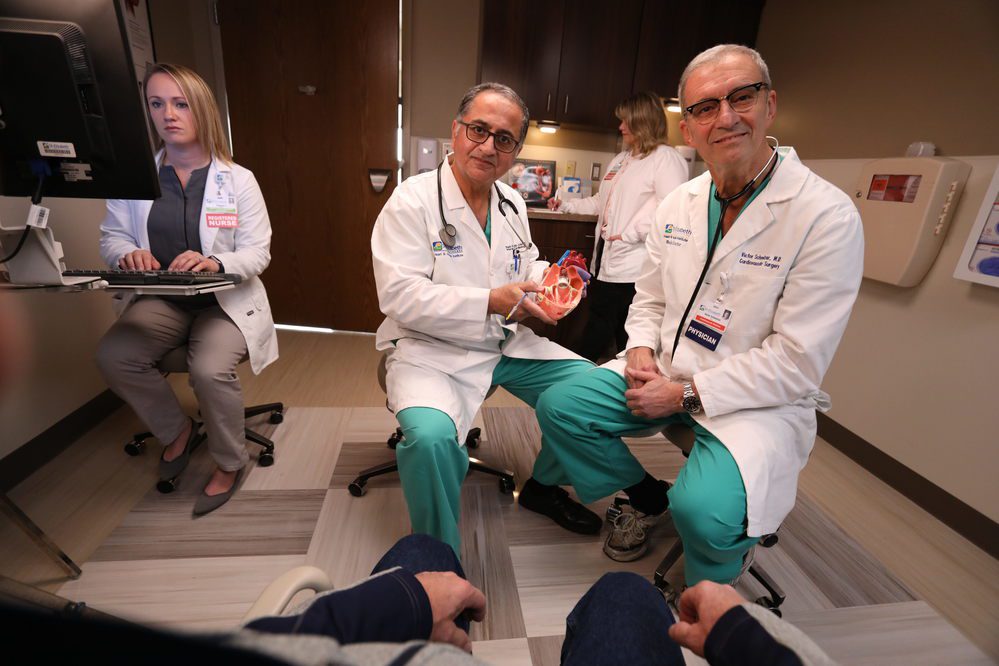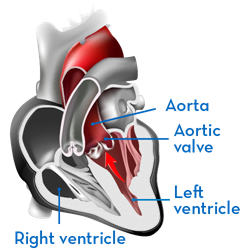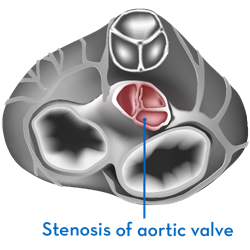Aortic Valve Replacement
If you have aortic valve disease, our team of experienced valve specialists at Florence Wormald Heart & Vascular Institute at St. Elizabeth Structural Heart and Valve Center offers you the most advanced treatments for aortic valve problems. We provide individualized, personal care, carefully reviewing your medical history and test results so we can offer you the best treatment possible for your condition.
You’ll have a nurse navigator to help set up appointments and coordinate your care every step of the way. At your first appointment, you’ll sit down with a cardiac surgeon and interventional cardiologist who will make a treatment plan with you to address your aortic valve disease.
Aortic Valve Disease Symptoms
Mild aortic stenosis often goes undetected. You may not notice symptoms until the problem becomes severe. Your doctor may hear an unusual sound called a heart murmur between your heartbeats.
As aortic stenosis worsens, you may have symptoms such as:
- Shortness of breath
- Breathing problems when exercising
- Fainting, weakness or dizziness with activity
- Chest pain or tightness
- Feeling that your heart is beating heavily
- Swelling in your ankles
- Fatigue or decline in normal activity

Aortic Valve Treatments
Medications may improve symptoms of aortic valve disease, but they do not stop progression of the disease. As the disease worsens, many people with aortic valve disease may need an aortic valve replacement.
Options for aortic valve replacement include open heart surgery or a minimally invasive approach called TAVR. At the St. Elizabeth Heart & Vascular Institute Structural Heart and Valve Center, our team of specialists provide an individualized evaluation to help determine which treatment option is best for you.
Open Heart Surgery
This is the traditional approach to replacing a faulty aortic valve. Your surgeon will cut through your breastbone to access your heart. A heart-lung bypass machine will do the work of your heart during the procedure.
Your surgeon will remove your narrowed aortic valve and replace it with an artificial valve. It will either be a mechanical valve made of ceramics, stainless steel or titanium, or a valve made from cow or pig tissue.
The surgery takes about three to five hours.
You will stay in the hospital for five to seven days so you can heal. It will take a few weeks to several months to fully recover from surgery.
Minimally Invasive Aortic Valve Replacement – TAVR
Transcatheter aortic valve replacement (TAVR – pronounced TAVV er) is a minimally invasive procedure that is now an option for many patients.
TAVR involves inserting a small tube called a catheter into an artery in your groin, and in certain cases, it may be necessary to place the catheter through an artery in your shoulder or neck. At the end of the catheter is a new heart valve made from animal tissue. Your doctor will guide the catheter and valve into your heart to the aortic valve.
Your doctor precisely places your new valve inside your old valve to regulate blood flow into the aorta.
The TAVR procedure takes about one to two hours. Its advantages over open heart surgery are less blood loss, less risk of infection and less pain after the procedure. You will spend two to five days in the hospital and generally return to normal activity within one to two weeks.
Long-Term Outlook
Valve replacement surgery has a very high success rate in relieving symptoms and a low rate of problems. It is best to seek a program like Florence Wormald Heart & Vascular Institute at St. Elizabeth Structural Heart and Valve Center that has experience performing a high volume of open heart surgery and TAVR cases.
Once you have your new aortic valve, you will take blood-thinning medication to help prevent blood clots. You may also need to take medication before certain dental procedures for infection prevention.
To keep your heart and aortic valve healthy, your doctor may suggest regular exercise, eating a low-fat, heart-healthy diet, keeping a healthy weight and not smoking.
Types of Aortic Valve Disease

The main type of aortic valve disease is aortic stenosis, one of the most common heart valve problems. Aortic stenosis is a stiffening and narrowing of the valve that prevents the valve from opening properly. The narrowed opening limits blood flow to the brain and other parts of the body. This makes your heart work harder.

The other main type of aortic valve disease is called aortic valve regurgitation. This means that when the valve doesn't close properly, blood backs up into the left ventricle. This also makes the heart work harder, because less blood is flowing into the aorta and out to other parts of the body.
Roy “Bud” Smith
At the age of 90, Roy “Bud” Smith still had a lot of living to do. But with a failing heart valve, his options were limited until he learned about TAVR – a minimally invasive approach to valve replacement. Now 97, Bud was one of St. Elizabeth’s first TAVR patients in 2014. With 300 procedures completed, St. Elizabeth has helped hundreds of patients like Bud enjoy life with a new heart valve.



